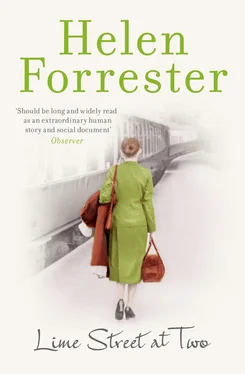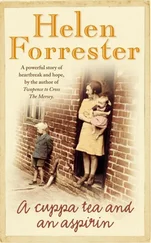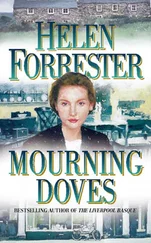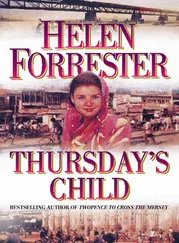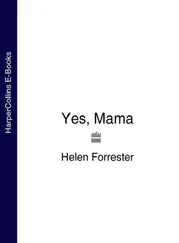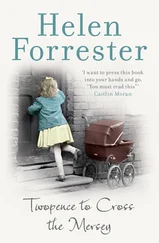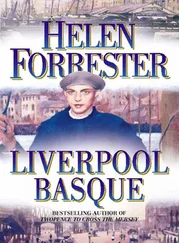A beshawled neighbour of whom I had once asked the time, because our single clock had stopped, had said to me disparagingly, ‘’Asn’t your Dad got a watch? All lace curtains and nothin’ in the larder, that’s your Mam and Dad.’ And she had sighed, as she looked me up and down.
A scared waif of a girl, I had not known how to answer her, so I had hung my head and shuffled away with Baby Edward in his squeaking pram.
Whenever Mother was short of ready money, she would collect any spare clothing lying about or some of our sparse bedding, and pawn it. Because I took great care of my few clothes, it was the shelf in the girls’ bedroom which was first raided.
I was frequently reduced to the clothes I had on, and then had to save up, penny by penny, to retrieve the rest from Uncle Joe, the pawnbroker.
It was a game I could not win. Years later, however, I bought very cheaply a chest of drawers which had been badly seared by fire. A kindly man friend, aware of the problem, made a key to fit the old-fashioned locks on the drawers. Mother had one of her bigger tantrums on the subject of these locks, and she immediately demanded a key. I refused her, and carried the single key threaded on a piece of string round my neck, with Harry’s ring.
When I heard from Harry’s mother that he had been killed, I was devastated not only by grief, but, in the background of my pain, also by the knowledge that I had lost my sole defence against my mother. As my friends in the Dance Club had sharply reminded me, nice girls did not leave home – they might have added, except, of course, to be married.
Sometimes, in those early weeks after Harry’s death and after the row I had had with Mother about being the family housekeeper, I would stand behind the high shelves of files in the office of the charity for which I worked, and hold my head, while I shivered helplessly. Father had tried to act as peacemaker between Mother and me, by saying we should first try if we could manage without someone at home. Mother had reluctantly agreed, but she continued to nag at me about it. I wondered if between sorrow and Mother and hunger, I would go mad. Then I would renew my efforts to find better-paid work. At least, I thought, that might settle the problem of being always hungry.
Mother had many small ways of trying to make it impossible for me to go to work. One was to pilfer any money I had, so that I had no tram fares for the five-mile journey to Bootle where lay the office of the Charity who employed me.
I kept a close eye on my handbag, but sometimes not close enough. I also tried secreting tram fares in the bedroom which I shared with Fiona and Avril, but a room furnished only with a double bed, a single shelf and no floor covering, does not offer many hiding places. Several times, I put a week’s fares up the chimney, getting very sooty in the process, but she either found the money herself or, perhaps, Fiona mentioned it to her as an idiosyncrasy of mine.
Fiona was always asked if she would lend money and always wailed miserably that she had none. Her ability to burst into floods of tears, her gorgeous light-blue eyes welling up piteously, always defeated Mother, whereas my verbal fury merely bred acidity in return.
A few weeks after Harry’s death, of which, of course Mother knew nothing, she had done one of her lightning swoops on my belongings and had pawned them. The blouse and underwear which I had been wearing that day had to be washed and dried overnight, ready to put on the next morning. In a world where washers and dryers had not yet been heard of, this meant putting on damp clothing every morning. Frequently there was no washing powder or soap, so my white blouse had, in Liverpool’s polluted air, become grey.
It was some time before I managed to save up two shillings (ten pence in today’s money) in order to redeem a change of garments from my old friend, the pawnbroker.
The only method of saving which I could think of was to walk most of the way to and from work. My two shorthand pupils paid me one shilling and sixpence a lesson, but I had recently lost one of them when I tried to increase my charge to two shillings. To get another one, I would have to advertise in the Liverpool Echo or Evening Express , and I had yet to find the money for that.
At the same time, as the Battle of Britain progressed, air raids became frequent.
The raids usually began about six o’clock in the evening and lasted until eleven or twelve. It was everybody’s ambition to be safely at home, or wherever they were going to be in the evening, before the air-raid warning howled its miserable notes across the waiting city. This was usually an impossibility for me, because, as the raids gained in intensity and the bombed-out sought our aid, the load of work in the office increased proportionately.
We worked later and later. My colleague, on whom devolved the ultimate responsibility for the office, looked ever more careworn; her skin was pasty from lack of fresh air and her eyes black-rimmed. She was a wonderfully caring person who gave of herself unsparingly to our distraught clients.
The five miles to work seemed to take a lifetime to walk. I went down the hill and through the city, and out again, along Byrom Street, Scotland Road and the eternity of Stanley Road, through some of Liverpool’s worst, festering slums. Like many English people who commonly travelled long and inconvenient distances by public transport to their employment, I arrived already very tired. Because roads were blocked by fallen debris or railways were out of commission, many others beside myself were forced to walk. A walk which I would have cheerfully undertaken, however, if it had been necessitated by an air raid, depressed me beyond measure because it was totally unnecessary.
Only people who have had to walk without a torch or cycle without a lamp through the total darkness of a blackout can appreciate the hazards of it. Innumerable cats and dogs trotted silently through it, to be tripped over by cursing pedestrians; pillar boxes and fire hydrants, telephone poles and light standards, parked bicycles and the occasional parked car, not to speak of one’s fellow pedestrians, all presented pitfalls for the unwary. Many times I went home with a bloody nose or with torn stockings and bleeding knees from having tripped up. Another problem was the ease with which one could lose one’s way; it was simple to become disoriented while crossing a road or a square and end up on the wrong pavement, hopelessly lost.
A new hazard appeared later in the war, and was the cause of Father’s having a painful fall, when the batteries of his flashlight failed. Lack of sufficient water pressure to douse the fires raised by incendiaries had necessitated the laying of extra water pipes directly from the river. The pipes ran along the street gutters or the edge of the pavements, and even in the daytime, people occasionally fell over these unaccustomed barriers. Father, one night, tripped over a newly laid pipe and bruised himself badly. He lay on the pavement in the dark, too shaken to get up, until he heard footsteps approaching.
He cried for help, and was immediately answered by a male voice. He was located, helped up and asked about his injuries. Father said that he was all right, that the fright of the fall had given him heart pains which had now ebbed.
‘I’m lost, however,’ he said.
The stranger asked his address, and Father told him it.
‘Oh, that’s easy. I’ll have you home in a couple of shakes,’ promised the man. ‘Put your arm in mine.’
‘Have you a torch?’ inquired Father, very puzzled at his rescuer’s self-assurance in the total darkness.
The stranger laughed. ‘I don’t need a light,’ he said. ‘I’m blind. Didn’t you hear my stick on the pavement?’
Читать дальше
